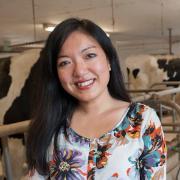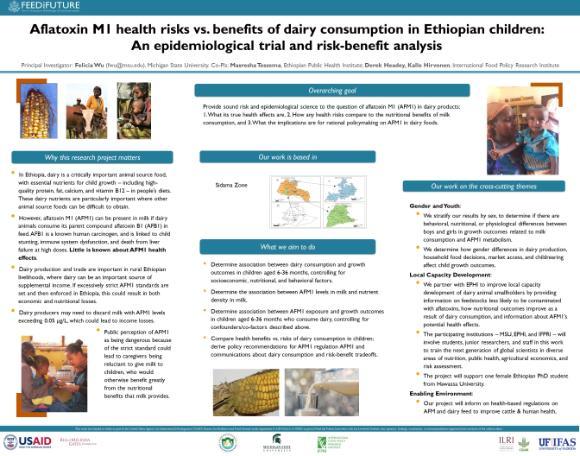Aflatoxin M1 Health Risks Vs. Benefits Of Dairy Consumption In Ethiopian Children: An Epidemiological Trial And Risk-Benefit Analysis
- Research Project Location: Ethiopia
- Timeframe: August 2022 - April 2025 (Terminated in February 2025)
- Funding: USAID
Introduction
Knowledge is currently lacking on the tradeoffs for children between aflatoxin M1 (AFM1) exposure in milk and nutritional outcomes. A longitudinal cohort study of children in Ethiopia can help clarify this connection and lead to policy recommendations on AFM1 regulation and dairy nutrition.
Project Goal and Objectives
Our goal was to determine whether aflatoxin M1 exposure in milk is associated with child growth impairment and to compare any risks with nutritional benefits of milk consumption in children. Based on our results from a longitudinal cohort study in Ethiopia, we will design policy recommendations and education-outreach workshops and briefs to enable sensible policy on AFM1 regulation and dairy nutrition. Specific objectives are to:
- Determine the association between dairy consumption and growth outcomes in children aged 12-24 months
- Determine the association between AFM1 density in milk and nutrient density in milk
- Determine the association between AFM1 exposure and growth outcomes in children aged 12-24 months who consume dairy
- Compare health benefits vs. risks of dairy consumption in children, and derive policy recommendations for AFM1 regulation AFM1 and communications about dairy consumption and risk-benefit tradeoffs.
Background
Aflatoxin M1 (AFM1), found in dairy foods, is a metabolite of aflatoxin B1 (AFB1): a toxic and carcinogenic mycotoxin produced by the fungi Aspergillus flavus and A. parasiticus in food and feed crops such as maize, groundnuts, tree nuts, and seeds. When dairy animals consume feed contaminated with AFB1, they secrete AFM1 in milk; hence, humans can become exposed through consuming dairy foods.
Our recent cancer risk assessment determined negligible cancer risk from AFM1 exposure through milk consumption. Nonetheless, it is possible that AFM1 may have adverse health effects beyond cancer, particularly in children who globally consume relatively more milk. This research will be one of the first epidemiological studies that combines the analysis of toxicological and nutritional aspects of milk with growth outcomes in children.
Research Approach
We will gather a cohort of 1,000 children ages 12-24 months at baseline in dairy cow-owning households across the Southern Nations, Nationalities, and Peoples (SNNP) region of Ethiopia. We will gather milk samples to test for AFM1, nutrients, and pathogens; maize samples to test for AFB1; and administer household and dietary surveys and measure children’s height, weight, and head circumference. Six months later, we will gather these same measures. Controlling for socioeconomic and demographic factors, and children’s diets and nutritional content of the milk gathered from each household, we will determine how milk consumption on the whole, and AFM1 exposure specifically, correlate with children’s growth and health outcomes.
Principal Investigator (PI) and Lead Institution

Felicia Wu, Michigan State University
Additional collaborators
- Derek Headey, International Food Policy Research Institute (IFPRI)
- Kalle Hirvonen, IFPRI
- Masresha Tessema, Ethiopian Public Health Institute
Resources






